外研版(2019)选择性必修第四册Unit 1 Looking forwards-Using language 2 课件(共26张PPT)
文档属性
| 名称 | 外研版(2019)选择性必修第四册Unit 1 Looking forwards-Using language 2 课件(共26张PPT) | 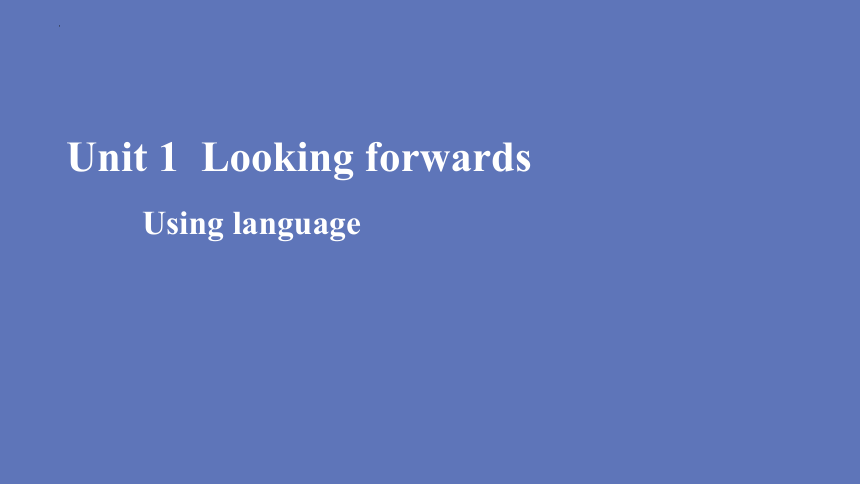 | |
| 格式 | zip | ||
| 文件大小 | 347.2KB | ||
| 资源类型 | 教案 | ||
| 版本资源 | 外研版(2019) | ||
| 科目 | 英语 | ||
| 更新时间 | 2022-08-03 09:49:00 | ||
图片预览

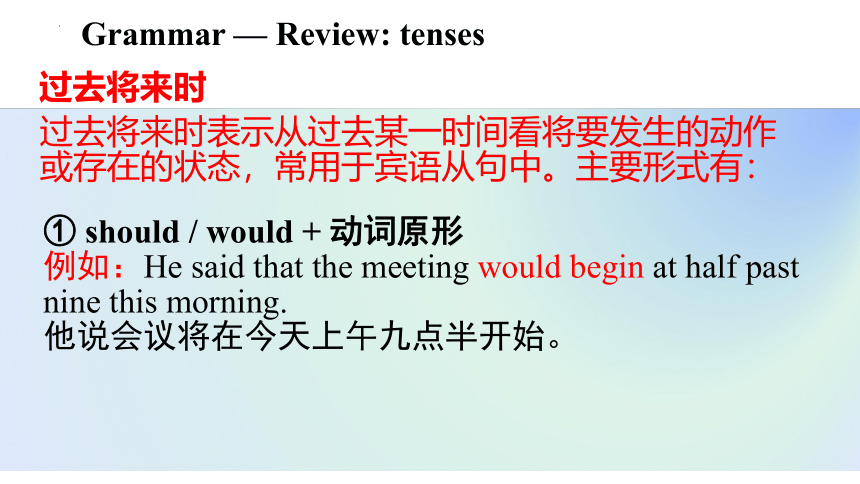
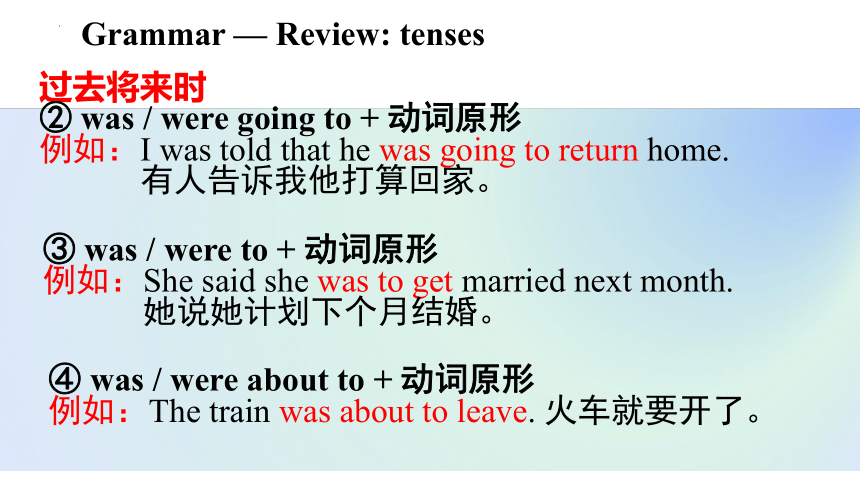
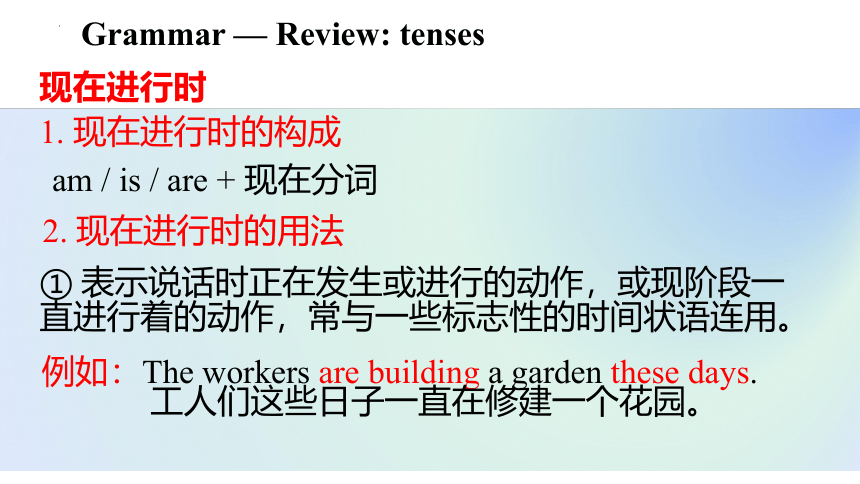
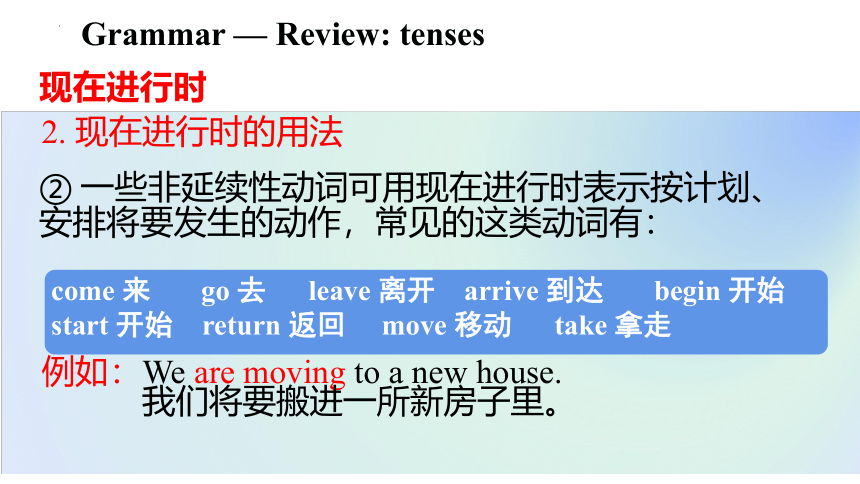
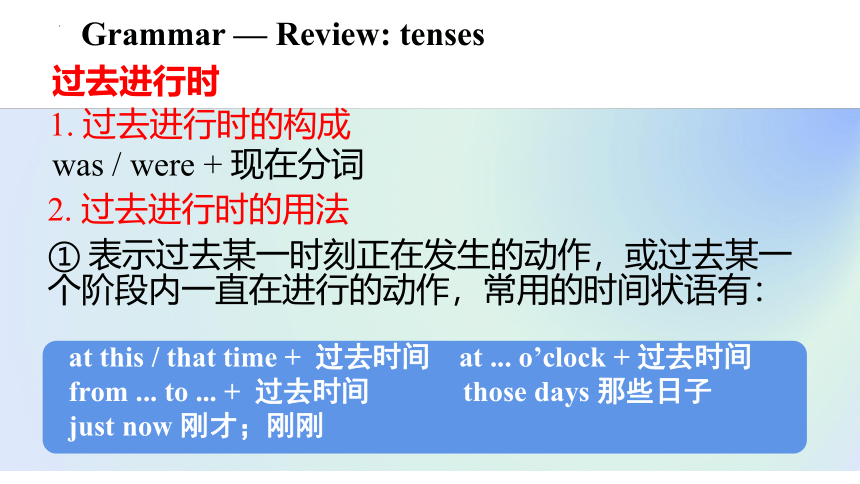
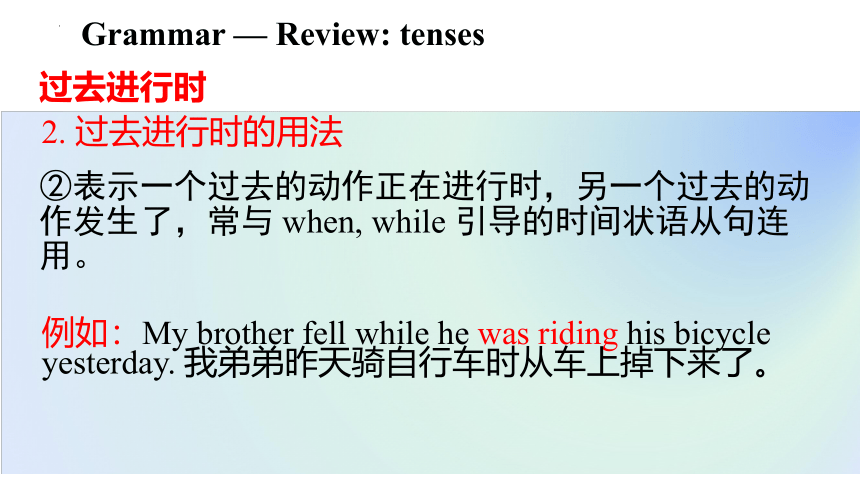

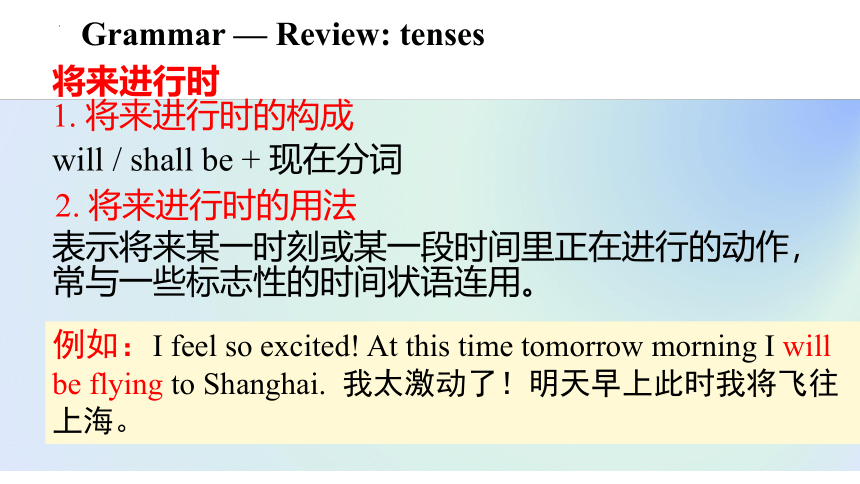
文档简介
(共26张PPT)
Using language
Unit 1 Looking forwards
过去将来时表示从过去某一时间看将要发生的动作或存在的状态,常用于宾语从句中。主要形式有:
过去将来时
① should / would + 动词原形
例如:He said that the meeting would begin at half past nine this morning.
他说会议将在今天上午九点半开始。
Grammar — Review: tenses
过去将来时
Grammar — Review: tenses
② was / were going to + 动词原形
例如:I was told that he was going to return home.
有人告诉我他打算回家。
③ was / were to + 动词原形
例如:She said she was to get married next month.
她说她计划下个月结婚。
④ was / were about to + 动词原形
例如:The train was about to leave. 火车就要开了。
1. 现在进行时的构成
现在进行时
am / is / are + 现在分词
2. 现在进行时的用法
① 表示说话时正在发生或进行的动作,或现阶段一直进行着的动作,常与一些标志性的时间状语连用。
例如:The workers are building a garden these days.
工人们这些日子一直在修建一个花园。
Grammar — Review: tenses
现在进行时
2. 现在进行时的用法
② 一些非延续性动词可用现在进行时表示按计划、安排将要发生的动作,常见的这类动词有:
例如:We are moving to a new house.
我们将要搬进一所新房子里。
come 来 go 去 leave 离开 arrive 到达 begin 开始
start 开始 return 返回 move 移动 take 拿走
Grammar — Review: tenses
1. 过去进行时的构成
过去进行时
was / were + 现在分词
2. 过去进行时的用法
① 表示过去某一时刻正在发生的动作,或过去某一个阶段内一直在进行的动作,常用的时间状语有:
at this / that time + 过去时间 at ... o’clock + 过去时间
from ... to ... + 过去时间 those days 那些日子
just now 刚才;刚刚
Grammar — Review: tenses
过去进行时
2. 过去进行时的用法
②表示一个过去的动作正在进行时,另一个过去的动作发生了,常与 when, while 引导的时间状语从句连用。
例如:My brother fell while he was riding his bicycle yesterday. 我弟弟昨天骑自行车时从车上掉下来了。
Grammar — Review: tenses
过去进行时
2. 过去进行时的用法
③一些非延续性动词可用过去进行时表示过去按计划、安排将要发生的动作,多用于从句中。常见的该类动词有:
例如:He said he was starting tomorrow.
他说他打算明天出发。
come 来 go 去 leave 离开 arrive 到达 start 开始 return 返回 begin 开始
Grammar — Review: tenses
1. 将来进行时的构成
将来进行时
will / shall be + 现在分词
2. 将来进行时的用法
表示将来某一时刻或某一段时间里正在进行的动作,常与一些标志性的时间状语连用。
at this time tomorrow / the day after tomorrow 明天/后天的这个时间 (by) then 那时 from 1:30 to 4:30 tomorrow / the day after tomorrow 明天/后天从1:30到4:30
例如:I feel so excited! At this time tomorrow morning I will be flying to Shanghai. 我太激动了!明天早上此时我将飞往上海。
Grammar — Review: tenses
1. 现在完成时的构成
现在完成时
have / has + 过去分词
2. 现在完成时的用法
①表示动作或过程发生在说话之前某个没有明确说出的过去时间,但现在已经完成,且其结果对现在仍有影响。常用的时间状语有:
lately 近来 recently 最近 so far 到目前为止 up to / till now 直到现在 by now 到现在 in the last / past few days / years 在过去的几天/几年里
Grammar — Review: tenses
现在完成时
2. 现在完成时的用法
②表示从过去开始一直持续到现在的动作或状态,可能还会继续进行下去,常用的时间状语有:
例如:His first novel has received good reviews since it came out last month. 他的首部小说自上个月出版以来获得了许多好评。
He has taught Chinese for more than 20 years.
他教中文已有20多年了。
since + 时间点/从句 for + 时间段
Grammar — Review: tenses
现在完成时
例如:他已经参军三年了。
He joined the army three years ago.
He has been a soldier for three years.
He has been in the army for three years.
注意
瞬间动词可以用于现在完成时,但在肯定句中不能与表示一段时间的状语连用。常用的瞬间动词有:go, come, arrive, leave, begin, borrow, buy, die, fall, stop, start, kill, close, join 等。
Grammar — Review: tenses
1. 过去完成时的构成
过去完成时
had + 过去分词
2. 过去完成时的用法
①表示在过去某一时间或过去某一事件之前已经发生并完成的动作,即“过去的过去”。
例如:The film had begun when we got to the cinema yesterday. 昨天我们到达电影院时,电影已经开始了。
Grammar — Review: tenses
过去完成时
2. 过去完成时的用法
② 表示一个动作或状态从过去某一时间之前已经开始,一直持续到过去这一时刻,并也可能继续下去。常用的时间状语有:
by then 到那时为止 by that time 到那时候
before... 在……之前 by the end of 到……末为止
until then 直到那时
by the time + 一般过去时的从句 到……时候
例如:By the time Jack returned home from England, his son had graduated from college.
杰克从英格兰回到家中时,他的儿子已大学毕业。
Grammar — Review: tenses
过去完成时
2. 过去完成时的用法
③ intend, mean, hope, want, plan, suppose, expect, think等动词的过去完成时,可表示过去未曾实现的愿望或想法等。
例如:I had intended to call on you yesterday, but I had an unexpected visitor. 我本来打算昨天去看你的,但我这边来了一个不速之客。(实际上没去)
Grammar — Review: tenses
1. 现在完成进行时的构成
现在完成进行时
have / has been + 现在分词
2. 现在完成进行时的用法
表示从过去某一时刻开始,一直持续到现在的动作。这一动作可能刚完成,也可能仍在进行。常用的时间状语有:
all this morning 整个早上 recently 最近 this month 这个月 these few days 这几天 since ... 自从……
例如:Tom has been working in the library every night over the last three months.
Grammar — Review: tenses
Complete the blog with the correct form of the verbs in brackets.
<
>
+
I woke at dawn again and already the birds 1 ___________ (sing). In the coming days, we 2 ________________ (paint) the toilet block that we had been building over the last two months.
were singing
would be painting
Grammar — Review: tenses
<
>
+
I 3 _______________________________ (live) in this Cambodian village for two months. Despite the hard physical work, I 4 _____________________________(not regret) for one moment choosing to spend my gap year as a volunteer for the Cambodia Foundation. It is wonderful to meet such friendly local people who are happy to share their lives with us.
have been living / have lived
don’t regret / haven’t regretted
Complete the blog with the correct form of the verbs in brackets.
Grammar — Review: tenses
<
>
+
I 5______ (feel) happy and free of worries. And of course, I 6 __________________________ (become) fitter. This gap year has been a fantastic opportunity for my personal growth, and I surely
7 ______________ (continue) to learn about how other people live their lives after it ends.
feel
have become / am becoming
will continue
Complete the blog with the correct form of the verbs in brackets.
Grammar — Review: tenses
David Mason
PERSONAL INFORMATION
Date of Birth 20 June 2001
Nationality British
EDUCATION
2007-2013 Carson Primary School
2013-2019 Wildwood High School
Work in pairs. Read the profile and talk about David’s life using different tenses where appropriate.
Grammar — Review: tenses
David Mason
EXTRACURRICULAR EXPERIENCE
Sept 2017 first prize for school science project
Apr-Oct 2018 exchange programme in China
Jul 2019-present gap year in Cambodia
Work in pairs. Read the profile and talk about David’s life using different tenses where appropriate.
Grammar — Review: tenses
David Mason
FUTURE PLANS
undergraduate study at Newcastle University
chemical engineer after graduation
voluntary work to help people in need
Work in pairs. Read the profile and talk about David’s life using different tenses where appropriate.
Grammar — Review: tenses
Work in pairs. Read the profile and talk about David’s life using different tenses where appropriate.
Examples:
David Mason was born on 20 June in 2001.
He studied in Carson Primary School from 2007 to 2013.
He is going to do voluntary work to help people in need.
......
David Mason
Grammar — Review: tenses
Work in pairs. Interview each other about your past experience and future plans. Share them with the class using different tenses where appropriate.
Grammar — Review: tenses
Ⅱ
Vocabulary building
Vocabulary building
What difficult decision is Li Ling facing Why is she feeling worried
2. What does Jenny suggest to her
3. What would you do when faced with a
difficult decision
Read the conversation and answer the questions. Pay attention to the expressions in bold.
Using language
Unit 1 Looking forwards
过去将来时表示从过去某一时间看将要发生的动作或存在的状态,常用于宾语从句中。主要形式有:
过去将来时
① should / would + 动词原形
例如:He said that the meeting would begin at half past nine this morning.
他说会议将在今天上午九点半开始。
Grammar — Review: tenses
过去将来时
Grammar — Review: tenses
② was / were going to + 动词原形
例如:I was told that he was going to return home.
有人告诉我他打算回家。
③ was / were to + 动词原形
例如:She said she was to get married next month.
她说她计划下个月结婚。
④ was / were about to + 动词原形
例如:The train was about to leave. 火车就要开了。
1. 现在进行时的构成
现在进行时
am / is / are + 现在分词
2. 现在进行时的用法
① 表示说话时正在发生或进行的动作,或现阶段一直进行着的动作,常与一些标志性的时间状语连用。
例如:The workers are building a garden these days.
工人们这些日子一直在修建一个花园。
Grammar — Review: tenses
现在进行时
2. 现在进行时的用法
② 一些非延续性动词可用现在进行时表示按计划、安排将要发生的动作,常见的这类动词有:
例如:We are moving to a new house.
我们将要搬进一所新房子里。
come 来 go 去 leave 离开 arrive 到达 begin 开始
start 开始 return 返回 move 移动 take 拿走
Grammar — Review: tenses
1. 过去进行时的构成
过去进行时
was / were + 现在分词
2. 过去进行时的用法
① 表示过去某一时刻正在发生的动作,或过去某一个阶段内一直在进行的动作,常用的时间状语有:
at this / that time + 过去时间 at ... o’clock + 过去时间
from ... to ... + 过去时间 those days 那些日子
just now 刚才;刚刚
Grammar — Review: tenses
过去进行时
2. 过去进行时的用法
②表示一个过去的动作正在进行时,另一个过去的动作发生了,常与 when, while 引导的时间状语从句连用。
例如:My brother fell while he was riding his bicycle yesterday. 我弟弟昨天骑自行车时从车上掉下来了。
Grammar — Review: tenses
过去进行时
2. 过去进行时的用法
③一些非延续性动词可用过去进行时表示过去按计划、安排将要发生的动作,多用于从句中。常见的该类动词有:
例如:He said he was starting tomorrow.
他说他打算明天出发。
come 来 go 去 leave 离开 arrive 到达 start 开始 return 返回 begin 开始
Grammar — Review: tenses
1. 将来进行时的构成
将来进行时
will / shall be + 现在分词
2. 将来进行时的用法
表示将来某一时刻或某一段时间里正在进行的动作,常与一些标志性的时间状语连用。
at this time tomorrow / the day after tomorrow 明天/后天的这个时间 (by) then 那时 from 1:30 to 4:30 tomorrow / the day after tomorrow 明天/后天从1:30到4:30
例如:I feel so excited! At this time tomorrow morning I will be flying to Shanghai. 我太激动了!明天早上此时我将飞往上海。
Grammar — Review: tenses
1. 现在完成时的构成
现在完成时
have / has + 过去分词
2. 现在完成时的用法
①表示动作或过程发生在说话之前某个没有明确说出的过去时间,但现在已经完成,且其结果对现在仍有影响。常用的时间状语有:
lately 近来 recently 最近 so far 到目前为止 up to / till now 直到现在 by now 到现在 in the last / past few days / years 在过去的几天/几年里
Grammar — Review: tenses
现在完成时
2. 现在完成时的用法
②表示从过去开始一直持续到现在的动作或状态,可能还会继续进行下去,常用的时间状语有:
例如:His first novel has received good reviews since it came out last month. 他的首部小说自上个月出版以来获得了许多好评。
He has taught Chinese for more than 20 years.
他教中文已有20多年了。
since + 时间点/从句 for + 时间段
Grammar — Review: tenses
现在完成时
例如:他已经参军三年了。
He joined the army three years ago.
He has been a soldier for three years.
He has been in the army for three years.
注意
瞬间动词可以用于现在完成时,但在肯定句中不能与表示一段时间的状语连用。常用的瞬间动词有:go, come, arrive, leave, begin, borrow, buy, die, fall, stop, start, kill, close, join 等。
Grammar — Review: tenses
1. 过去完成时的构成
过去完成时
had + 过去分词
2. 过去完成时的用法
①表示在过去某一时间或过去某一事件之前已经发生并完成的动作,即“过去的过去”。
例如:The film had begun when we got to the cinema yesterday. 昨天我们到达电影院时,电影已经开始了。
Grammar — Review: tenses
过去完成时
2. 过去完成时的用法
② 表示一个动作或状态从过去某一时间之前已经开始,一直持续到过去这一时刻,并也可能继续下去。常用的时间状语有:
by then 到那时为止 by that time 到那时候
before... 在……之前 by the end of 到……末为止
until then 直到那时
by the time + 一般过去时的从句 到……时候
例如:By the time Jack returned home from England, his son had graduated from college.
杰克从英格兰回到家中时,他的儿子已大学毕业。
Grammar — Review: tenses
过去完成时
2. 过去完成时的用法
③ intend, mean, hope, want, plan, suppose, expect, think等动词的过去完成时,可表示过去未曾实现的愿望或想法等。
例如:I had intended to call on you yesterday, but I had an unexpected visitor. 我本来打算昨天去看你的,但我这边来了一个不速之客。(实际上没去)
Grammar — Review: tenses
1. 现在完成进行时的构成
现在完成进行时
have / has been + 现在分词
2. 现在完成进行时的用法
表示从过去某一时刻开始,一直持续到现在的动作。这一动作可能刚完成,也可能仍在进行。常用的时间状语有:
all this morning 整个早上 recently 最近 this month 这个月 these few days 这几天 since ... 自从……
例如:Tom has been working in the library every night over the last three months.
Grammar — Review: tenses
Complete the blog with the correct form of the verbs in brackets.
<
>
+
I woke at dawn again and already the birds 1 ___________ (sing). In the coming days, we 2 ________________ (paint) the toilet block that we had been building over the last two months.
were singing
would be painting
Grammar — Review: tenses
<
>
+
I 3 _______________________________ (live) in this Cambodian village for two months. Despite the hard physical work, I 4 _____________________________(not regret) for one moment choosing to spend my gap year as a volunteer for the Cambodia Foundation. It is wonderful to meet such friendly local people who are happy to share their lives with us.
have been living / have lived
don’t regret / haven’t regretted
Complete the blog with the correct form of the verbs in brackets.
Grammar — Review: tenses
<
>
+
I 5______ (feel) happy and free of worries. And of course, I 6 __________________________ (become) fitter. This gap year has been a fantastic opportunity for my personal growth, and I surely
7 ______________ (continue) to learn about how other people live their lives after it ends.
feel
have become / am becoming
will continue
Complete the blog with the correct form of the verbs in brackets.
Grammar — Review: tenses
David Mason
PERSONAL INFORMATION
Date of Birth 20 June 2001
Nationality British
EDUCATION
2007-2013 Carson Primary School
2013-2019 Wildwood High School
Work in pairs. Read the profile and talk about David’s life using different tenses where appropriate.
Grammar — Review: tenses
David Mason
EXTRACURRICULAR EXPERIENCE
Sept 2017 first prize for school science project
Apr-Oct 2018 exchange programme in China
Jul 2019-present gap year in Cambodia
Work in pairs. Read the profile and talk about David’s life using different tenses where appropriate.
Grammar — Review: tenses
David Mason
FUTURE PLANS
undergraduate study at Newcastle University
chemical engineer after graduation
voluntary work to help people in need
Work in pairs. Read the profile and talk about David’s life using different tenses where appropriate.
Grammar — Review: tenses
Work in pairs. Read the profile and talk about David’s life using different tenses where appropriate.
Examples:
David Mason was born on 20 June in 2001.
He studied in Carson Primary School from 2007 to 2013.
He is going to do voluntary work to help people in need.
......
David Mason
Grammar — Review: tenses
Work in pairs. Interview each other about your past experience and future plans. Share them with the class using different tenses where appropriate.
Grammar — Review: tenses
Ⅱ
Vocabulary building
Vocabulary building
What difficult decision is Li Ling facing Why is she feeling worried
2. What does Jenny suggest to her
3. What would you do when faced with a
difficult decision
Read the conversation and answer the questions. Pay attention to the expressions in bold.
